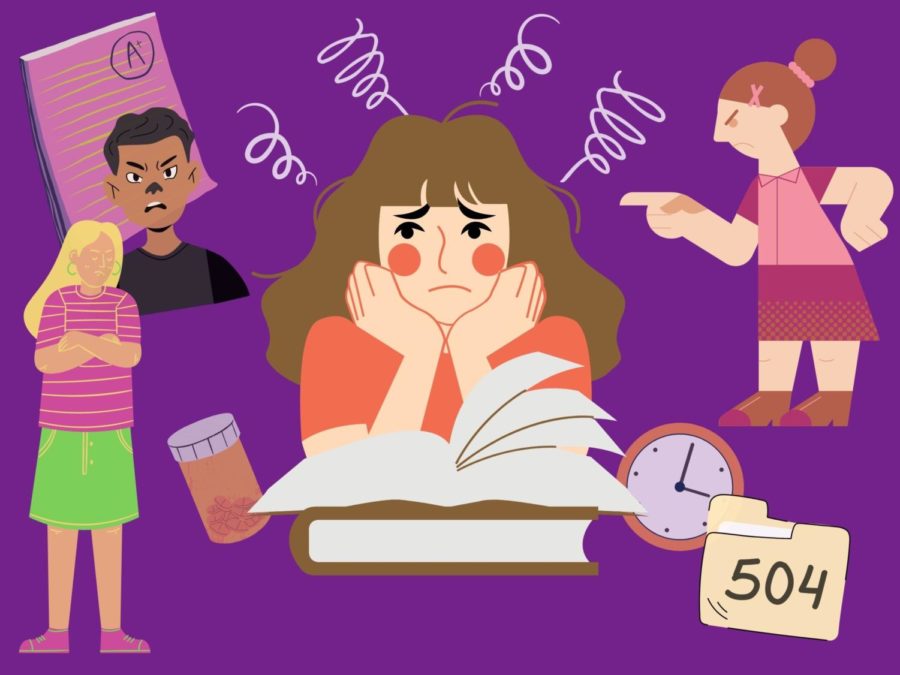Opinion: Taking my time
An engineer.
This was the response I gave my 11th grade teacher after she asked what I wanted to be when I grew up. In response, she told me I would never be able to accomplish this because I have accommodations for my ADHD that do not exist in the “real world.”
I never doubted my future goals until she told me this. Afterward, I put my head down on a lab table and sobbed as she passed out our test papers. I could barely see through the tears in my eyes, but I knew I had to answer the questions quickly because my teacher did not support my use of accommodations, so I would not receive my allotted extra time.
I was diagnosed with ADHD at the beginning of my junior year after semesters of trying everything to find success in school. My parents and I decided I needed a 504 plan once I was failing my AP U.S. History class despite the hours of effort I put in. Once I started utilizing my accommodations, however, this all changed and my history teacher even acknowledged my hard work and praised my new grades. While this was nice to hear, the contradicting comments from my other teacher caused me to question my abilities.
Senior year, I had to take AP Calculus in order to be considered for certain engineering programs, and I had never felt so out of place as I did walking into that classroom. When the time came for our first test, I was terrified to ask my teacher about using my extra time from my 504 plan. I prepared myself for him to shame me or refuse the use of accommodations, and I was ready to have my confidence destroyed once again.
When I finally mustered up the courage to ask him, I was shocked when he was happy to provide me with extra time and even more surprised when I passed my test. A five minute interaction during my junior year led me to believe I would struggle with this course considering it was a stepping stone to a future in engineering, but instead, my grades continued to improve as the class continued.
While my teacher last year left me with serious self-doubt, so has commentary from my peers. It can be quite obvious when I have to stay after class to finish a test or sit in the hall to avoid distractions. There have been multiple occasions when people who are aware of my accommodations attribute my good grades to my use of extra time. People have told me they could have done “just as well” as I did if they received the same accommodations.
While most people who make these comments do not intend to hurt me, their failure to understand the purpose of accommodations causes me to doubt my intelligence. I try to joke about my ADHD as an attempt to disguise my insecurity, but this has allowed others to comment on my disorder.
Moreover, these interactions have made me insecure about opening up to others about the challenges I face. In one particular instance, someone said they believed I “made up” my ADHD, which especially hurt because they were once empathetic toward my struggles. At that moment, I felt as though my coping mechanisms were stripped from me.
These outside opinions make me feel as though I need to fit certain labels: constantly struggling in my classes because I have a learning disability or not using accommodations so I can actually “earn” my grades. People don’t understand that accommodations are simply a crutch for me, staring at a test for a few extra minutes does not make me magically understand a subject. I was a hard worker prior to my diagnosis, but that came with a long period of struggling before I could find my success in a subject. Now, I still have to exhaust myself studying, but the extra 30 minutes I spend on a test does not minimize my aptitude.
With such a spectrum of reactions from people, I often wish I could have been diagnosed sooner. Maybe then, I would have found the right medication earlier or already have been weaned off my accommodations. But I have come to realize that I would have missed the opportunity for personal growth. The challenges I have encountered have formed my current work ethic and my experiences with invalidation have forced me to recognize my capability. Despite a teacher’s lack of faith in my future, my hard work has paid off. Now, I am not the only one aware of my strengths, but so are the engineering programs that accepted me.

Senior Malley O’Carroll is the social media manager and this is her third year on staff. She loves spending time with her family and friends, traveling,...




